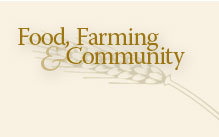The High Cost of Cheap Food
Session 4
Summary
This session addresses how policies impact the price and cost of food. Through a simple card game, learners examine the hidden environmental and social costs of two contrasting meals. Guided reading selections help learners understand some basic ways the Farm Bill impacts food production and food prices.
The issue of subsidies and their impacts is too complex to address in a single session. This session provides an introduction with the aim of familiarizing learners with some of the basic economics of price and cost. A supplemental packet for Session 4 provides a more in-depth look at the issue of commodity subsidies and their impacts throughout the food system.
Guiding Questions
- What is the difference between price and cost?
- What is the Farm Bill? How does it affect the price of food?
- What are some impacts of the Farm Bill?
- What policies could support a sustainable food system?
Big Ideas
- The way food is made has impacts on communities, workers, consumers, and the environment. Price, cost and value are three different concepts that relate to what consumers pay for a product, the impacts of production, and the benefit (“utility”) gained.
- Price is the amount of money a consumer directly pays for an item.
- Cost is the impact on workers and the environment not directly reflected in the price.
- Value is the overall worth and benefit. Not all things of value (family, beauty, kindness) have a price.
- The Farm Bill is major piece of federal legislation that affects how food is grown, in part through the allocation of subsidies (price supports). In past decades, the Farm Bill has provided subsidies to reward large-scale production of key commodities: corn, soy, rice, cotton and wheat. Large-scale producers of these commodities have been the biggest beneficiaries of the bill.
- Subsidies have influenced what farmers plant, how meat is produced, the price of foods containing subsidized crops, and the health of animals and people.
Session 4 Materials
- Facilitator Guide (PDF/6 pgs)
- Learner packet (PDF/13 pgs)
- Supplemental packet (PDF/15 pgs)
- PowerPoint slides (PPT)




